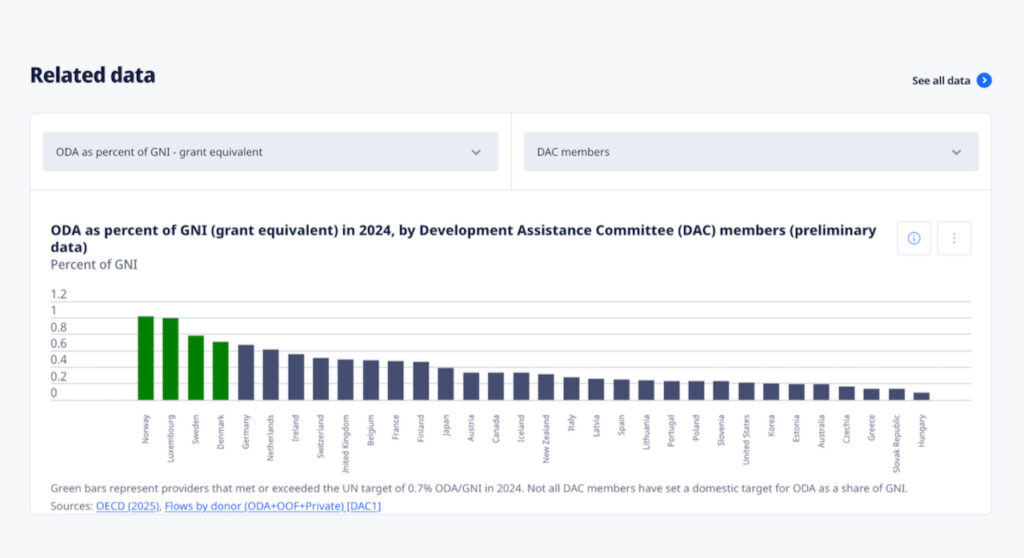The early figures for 2024 Official Development Assistance (ODA) confirm a deeply troubling trend: Europe’s richest countries per capita— such as Germany, Netherlands and Finland—are cutting back their commitments to international cooperation. The cuts are not just numbers on a page; they are political decisions with real-world consequences for millions of people’s lives and well-being. By pulling back, EU Member States and EU Institutions will also undermine the EU’s credibility as a partner.
“The European Union can’t have it both ways. It promotes the Global Gateway as a bold promise of shared prosperity and strategic investment in infrastructure, yet it slashes funding to countries with the greatest human development needs. If EU Member States and EU Institutions are even slightly concerned about our shared future, they must invest in people, not pull the rug out from under them. Shortsighted cuts now will undermine a secure and prosperous, common future.” – Tanya Cox, Director, CONCORD Europe

After five years of progress, ODA dropped in 2024. EU Member States part of the Development Assistance Committee (DAC) are also driving the downturn. ODA from EU Member States decreased to 88.7 billion USD. This represents 0,47% of EU Member States combined Gross National Income (GNI) and a decrease in ODA by 8,6% in real terms compared to 2023. Only three EU Member States allocated at least 0,7% of their GNI to ODA in 2024, one less than in 2023.
Once again, the EU’s inability to respect development assistance commitments goes hand-in-hand with reporting expenses as ODA that fall outside internationally agreed criteria. Despite calls for accountability, many of the EU Member States continue to hollow out their solidarity by allocating funds to cover the costs of hosting refugees within donor countries’ borders, referred to by the OECD as in-donor refugee costs. An alarming 13.1 % of DAC member countries total ODA is diverted to in-donor refugee costs, effectively rebranding domestic spending as ODA.

Meanwhile, ODA to Least Developed Countries (LDC) has only reached 35 billion USD, a fall of 3% in real terms compared to 2023. This practice shows that ODA is not strengthening the basic services and systems, like education and health, that we expect it to, in the places that need it most.
The EU must understand that poor ODA quality and shrinking envelopes are not simply about saving money. They mean less preparedness for all our futures, less human security and trust lost between partners. The EU is not making the cooperation system more efficient. It is dismantling the system it helped to build.
“The cuts combined with the recent USAID Stop-Work Order will only worsen the global outlook: a retreat from global responsibility, a rollback of progress in human development, and a signal to the world that commitments are conditional, fragile, and political. Is this the path the EU wants to follow? Is this the course of action that will make the world more secure?” – Lukas Wank, Director, Global Responsibility
This should be the moment when the EU steps up — rather than leaving the room. The EU and the world cannot afford the risk of short-sighted self-interest, it will come back to hit us. More info here.
Copyright 2025 Ambrela - Platform for Development Organisations. This site is funded by the EU via Stronger Roots and SR via SlovakAid. Ambrela is solely responsible for its content and does not necessarily reflect the views of the donors.